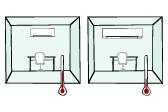
The size of the area you’re cooling will have a dramatic effect on how you’re able to cool it. Likewise, the way a room is cooled also depends on how it’s shaped.
The size and the shape of the room can have a dramatic effect on the cooling system you choose and how effective it turns out to be.

Fan performance
If all you’re after is a fan, then the answer is as simple as ensuring that the fans you have are large enough (and numerous enough) to circulate air around the room. Because they cool by means of air circulation, this is the only real criteria that needs to be satisfied. Compensating for a larger area when using fans can be as simple as turning the fan speed up, adding another portable fan to wherever it’s needed, or setting a portable fan to ‘swing’ mode.
Evaporative coolers
Windows and doors are one of the most important factors in cooling with an evaporative cooler. To allow for effective cooling with an evaporative cooler you need to make sure that you have adequate ventilation in a room through windows and doors.
Room size and air conditioner capacity
Cooling with refrigerative air conditioners is a completely different matter. The size and shape of a room make a huge difference to the performance of air conditioners, because these systems rely on physically cooling the air contained within the room. The bigger the room is, the more air there is to cool. Before you consider the type or size (capacity) of the air conditioner you want to install in your home, you should measure the length, width and height of the room that the air conditioner is intended for. These measurements are critical for an accurate calculation of the capacity required. Without knowing the exact dimensions of the area to be cooled, you run the risk of buying an air conditioner that is either too weak, or too powerful (and expensive) for your needs.
Windows and doors
A huge factor in how effective refrigerative air conditioning will be is how many windows (and doors) you have in the room, and what type of windows they are. Windows in particular are a tremendous heat sink, and account for the vast majority of the transmission of heat into and out of a room. Ensuring that you have low-e glass, double glazing or window film (and possibly some thermal curtains) will go a long way to ensuring that the room you are cooling stays cool. The amount of heat that can be transferred through windows is measured as a window’s U-value. The lower the U-value, the better the window’s resistance to heat.
Ensuring that your windows are properly sealed and shaded with exterior awnings will also help to reduce heat transmission. Perhaps the biggest consideration with windows is how big they are. The more window area in a room, the more you will need to address this as a serious factor in your choice of air conditioner.
External walls and insulation
Another factor that affects how well your refrigerative air conditioning will work is how well protected it is from the heat outside. Rooms with external walls that face the sun (particularly brick walls, which act as thermal mass) will inevitably be warmer than those on the other side of the house. In warmer climates, houses are normally designed to minimise this exposure. Good insulation in the walls and ceiling will go a long way to reducing the amount of heat that enters a room in this way.
How to estimate your needs
Once you have evaluated the conditions listed above, you may wish to use an online calculator to estimate how powerful the air conditioner you need to buy will be. There are a number available for free online, including one from the Australian Institute of Refrigeration, Airconditioning and Heating (AIRAH) on their FairAir site.
Other features of the room
Another important consideration when you’re evaluating how well your air conditioner will work (one you can’t immediately evaluate using a calculator) is the way the room is designed, and how it connects to other areas of the house. If you have a sunken lounge area, trapdoor cellar or a stairwell leading up or down from the room you are cooling, this will also affect how your room is cooled.
Cold air normally sinks down, so if your air conditioner is in a room with an open stairwell leading downstairs, you may find that an air conditioner is fairly ineffective. Likewise, if you have a trapdoor or hatch style cellar, you should ensure that the cracks around the door are properly sealed to prevent cool air leaking out. Sunken lounges or split level rooms will result in the cool air from the air conditioner pooling more quickly in the sunken area. Careful planning can turn this to your advantage, of course!
Although a calculator helps to give you a good idea of what’s necessary, if you’re serious about cooling your home properly (or worried that certain features might affect how it’s cooled) you should consult a trained professional who can advise on what would fit your home best.





